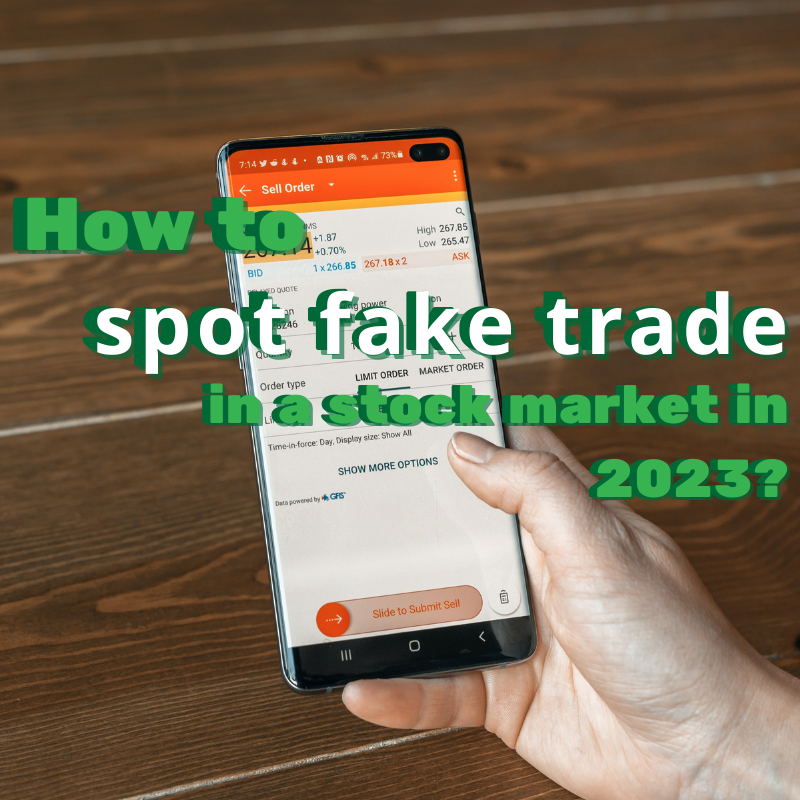Financial, Stock Market
Market Stock: How to spot fake trade in a stock market in 2023?
The well-known market “pump and dump” scheme is one of the most widespread online scams. Here’s how it works: A corporation may
post a nice news release about its financial standing or a new product or innovation on its website. It’s possible for newsletters
that claim to offer unbiased advice to suddenly promote the company as the newest “hot” stock. You can be urged to buy the
stock immediately or to sell it before the price drops in chat rooms and on message boards. Alternatively, a radio or television
analyst might make a reference to the business.
Cold calling was commonly used in market pump-and-dump tactics. But as the internet has grown in popularity, this illegal
behavior has multiplied. Online scammers post comments persuading investors to purchase stock right away by claiming to have
inside knowledge that a certain development will increase the market share’s price. Once buyers enter the market, the
perpetrators sell their shares, which causes the price to fall sharply. Then, new investors lose money.
The easiest stocks to manipulate in these schemes are micro- and small-cap stocks. It doesn’t take many new buyers to raise a
stock because these stocks have a small float.
The stock is then bought up by uninformed investors in large quantities, which raises demand and the price. The price of the
stock plummets and investors lose money when the con artists behind the plan sell their shares at the height and cease
advertising it.
Because it is simpler to manipulate a market stock when it is little to no information accessible about the company, fraudsters
typically utilize this scheme with small, thinly traded companies. Always research potential market investments before making one
to avoid scams:
-
Consider the Source
Until you can independently verify an offer’s validity, believe it is a fraud when you encounter it on the Internet. Additionally,
keep in mind that the individuals selling the stock may be hired shills or corporate insiders who stand to make a tidy profit if you trade.
-
Find Out Where the Stock Trades
The Philippine Stock Exchange, Inc.’s or a national exchange’s listing standards cannot often be met by many of the
smallest and thinly traded stocks. Instead, they trade on the “over-the-counter” market and are quoted on OTC platforms like the Pink Sheets or the OTC Bulletin Board. The majority of the time, stocks that trade on the OTC market are the riskiest and most vulnerable to manipulation.
-
Independently Verify Claims
Grandiose statements about upcoming market product developments, lucrative contracts, or the company’s financial
stability are simple for a business to make or for its promoters to make. However, be sure you’ve independently checked such claims before investing.
-
Research the Opportunity
Always request the prospectus or most recent market financial statements and carefully examine them. Always verify with
your state’s securities authority as some tiny businesses are not required to register their securities offerings. It’s a positive indicator if you receive intelligent responses that are supported by statistics, testimonies, research, or other reliable sources of information. Be quite suspicious if you only receive hot air and lofty promises. Investigate an investing offer online if you have any doubts. Many other investors are frequently happy to share their positive or negative experiences with others. Scammers and fraudsters frequently come to light, and the internet aids in swift communication.
-
There’s no Procedure for Verification
To make sure that all of the users on the platform are authentic, regulators insist that every new user who registers with an
online trading platform go through a rigorous verification process. If there isn’t a verification procedure, it’s probably a hoax. It’s crucial to be vigilant and review other sites that are similar to see where the gaps are or if there are any differences in copy or methods because some scammers might develop their own bogus verification process. Keep in mind that any respectable institution will confirm its own credentials and be able to demonstrate that it belongs to the organization it claims to represent. They ought to be able to identify themselves if you ask them questions. It’s very likely a scam if you hear a prerecorded message, especially if it contains a threat or warning.
-
Avoid High-Pressure Pitches
Don’t fall for the claim that you’ll miss out on a “once-in-a-lifetime” opportunity to make great money if you don’t move
immediately. Beware of promoters who rush you to buy before you have a chance to think about and thoroughly study the so-called “opportunity.”
-
Always Have Doubts
Ask yourself, “Why me?” whenever a stranger offers you a hot stock recommendation. What makes this stranger tip me
off? How would a trade benefit him or her? Undoubtedly, there are investment methods and chances that provide significant potential gains. And it’s okay to pursue those if you’re aware of the dangers and they fit well with your financial objectives. However, you should examine the possibility much more seriously if it makes a guarantee of astronomical returns with little to no risk.
-
Be Wary of the Most Popular Hot Investment
It seems like there is always some trendy investment trend that keeps rising as more and more people join.
Stocksassociated with marijuana, cryptocurrencies like Bitcoin, and shorted stocks are some recent instances (such as GameStop). On these kinds of investments, there are frequently people who do make a sizable profit. But they frequently enter the game quite early and are relatively fortunate. By the time the majority of investors learn about the incredible profits in the newest trending investment, it has typically turned into a bubble, which typically has a poor outcome.
If someone you don’t know gives you a stock tip, pause and consider why they would be so willing to give you such knowledge.
Always keep this investing adage in mind: “If it sounds too good to be true, it probably is.” It is doubtful that you will experience a
substantial and rapid return on your market investment. Additionally, it’s crucial that you study any investment on your own. This
ought to assist you in avoiding falling victim to such pump-and-dump frauds.
MUST-READ AND SHARE!
2023 Your Practical Wedding Guide
Your Ultimate Access to Kuwait Directories in this COVID-19 Crisis
Investments and Finance Ultimate Guide
OFW FINANCE – Money News Update that you need to read (Table of Contents)
A Devotional for having a Grateful Heart
Stock Investment A Beginner’s Guide
How To Save Money Amidst Inflation
Philippines Best Banks with High-Yield Savings Return
Essentials Before Applying For a Credit Card
Credit Card Starter Guide for Beginners
If you like this article please share and love my page DIARYNIGRACIA PAGE Questions, suggestions send me at diarynigracia @ gmail (dot) com
You may also follow my Instagram account featuring microliterature #microlit. For more of my artworks, visit DIARYNIGRACIA INSTAGRAM

A multi-award-winning blogger and advocate for OFWs and investment literacy; recipient of the Mass Media Advocacy Award, Philippine Expat Blog Award, and Most Outstanding Balikbayan Award. Her first book, The Global Filipino Bloggers OFW Edition, was launched at the Philippine Embassy in Kuwait. A certified Registered Financial Planner of the Philippines specializing in the Stock Market. A recognized author of the National Book Development Board of the Philippines. Co-founder of Teachers Specialist Organization in Kuwait (TSOK) and Filipino Bloggers in Kuwait (FBK). An international member of writing and poetry. Published more than 10 books. Read more: About DiaryNiGracia
Acknowledgements
DISCLAIMER



Peace and love to you.